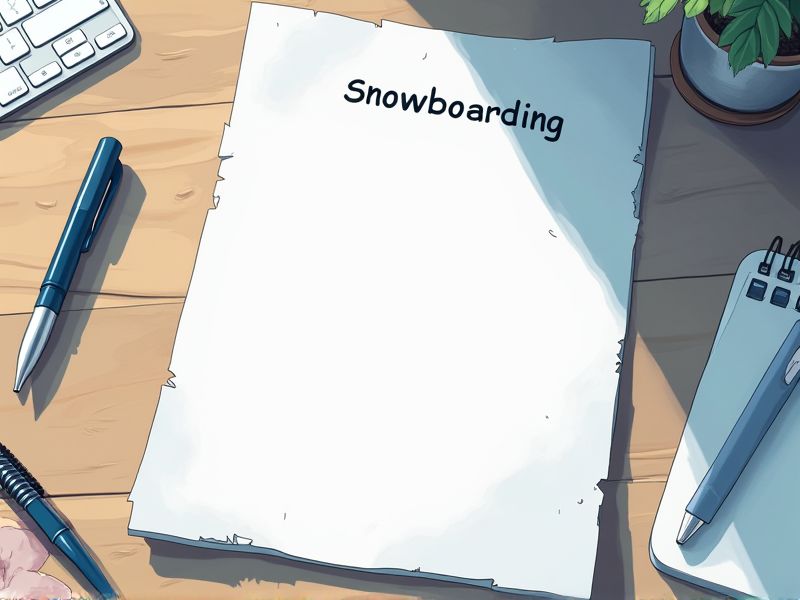
Snowboarding instructors require specific certifications to ensure they possess the technical skills and safety knowledge critical for teaching. These certifications validate an instructor's ability to offer effective guidance and manage diverse learning environments. Certified instructors help to minimize risk, providing a safe and enjoyable experience for students on the slopes. Essential certifications you may need for becoming a snowboarding instructor include the following.
AASI Level 1 Snowboard Instructor Certification
The AASI Level 1 Snowboard Instructor Certification provides foundational knowledge and skills, ensuring instructors have a competent understanding of snowboarding mechanics. It establishes a standardized curriculum that enhances teaching quality, leading to more effective communication with students. Certification assures potential employers of the instructor's capability and commitment to professional development within the industry. As the sport grows, certified instructors are more equipped to adapt to various learning styles and safety protocols.
AASI Level 2 Snowboard Instructor Certification
Achieving AASI Level 2 Snowboard Instructor Certification signifies a higher level of teaching proficiency and technical skill, allowing instructors to provide advanced coaching to students. Resorts often require this certification for teaching more challenging terrain, which enhances employment opportunities. With advanced techniques and pedagogical strategies learned through certification, instructors improve client satisfaction and retention. Certified instructors contribute to the overall safety and positive learning environment in snowboarding programs.
CASI Basic Snowboard Instructor Certification
Obtaining the CASI Basic Snowboard Instructor Certification ensures a standardized level of teaching competency, which enhances the overall learning experience for students. With the certification, instructors gain access to a recognized framework of techniques and safety protocols that improve lesson quality. Resorts often require certification for insurance and liability purposes, aligning with industry standards. Certification also increases employability and career advancement opportunities by demonstrating validated teaching skills.
CASI Advanced Snowboard Instructor Certification
The CASI Advanced Snowboard Instructor Certification ensures instructors possess a high level of technical and teaching skills, impacting the overall quality of snowboard instruction. Resorts often require this certification to maintain standards and ensure guest satisfaction. More skilled instructors can lead to fewer accidents on the slopes due to proper guidance and techniques. This certification also enhances an instructor's credibility and career opportunities in the snowboarding industry.
Avalanche Awareness and Safety Certification
Avalanche Awareness and Safety Certification equips snowboarding instructors with critical knowledge to assess snow conditions, reducing the risk of accidents. This training enhances decision-making capabilities, ensuring instructors can identify potential hazards and ensure student safety on the slopes. Certification indicates proficiency in avalanche rescue techniques, which is vital for effective emergency response during snowboarding activities. Gaining certification builds trust with students and ski resorts, reflecting a commitment to maintaining high safety standards in potentially dangerous environments.
Avalanche Rescue Techniques Certification
Avalanche Rescue Techniques Certification is needed for snowboarding instructors because it ensures they are equipped to handle potential life-threatening situations in avalanche-prone areas, increasing student safety. Certification demonstrates the instructor's capability to assess and mitigate avalanche risks, which builds trust with clients and demonstrates professionalism. Accidents in snowy terrains can occur unexpectedly; therefore, trained instructors can provide critical rescue and first-aid efforts promptly. Having certified instructors may also help resorts and snowboarding companies meet regulatory safety standards, reducing liability issues.
Wilderness First Aid Certification
Snowboarding often takes place in remote locations where access to immediate medical help is limited, so a Wilderness First Aid Certification equips instructors to handle injuries and emergencies promptly. Harsh weather and unpredictable conditions on the slopes can increase the risk of accidents, making it crucial for instructors to be adept in assessing and managing potential medical issues. Snowboarders may encounter injuries ranging from minor sprains to serious fractures; possessing the skills to stabilize such injuries can prevent further harm. Knowing how to effectively communicate medical conditions to first responders can facilitate quicker and more effective treatment for injured individuals.
CPR and AED Certification
Snowboarding involves high-risk activities, which increases the likelihood of accidents and injuries, necessitating CPR and AED certification to effectively respond to emergencies. Proper training equips instructors with the skills to manage cardiac events, which can occur unexpectedly at high altitudes or during exertion. Certification ensures that snowboarding instructors can provide immediate, life-saving care until professional medical help arrives. Having certified personnel on-site can reduce the response time in critical situations, potentially improving survival rates and safety standards.
Backcountry Risk Management Certification
Snowboarding instructors operate in unpredictable mountain environments, where Backcountry Risk Management Certification ensures they can identify and respond effectively to potential hazards. This certification equips instructors with critical skills to assess avalanche risks, crucial for avoiding life-threatening situations. Instructors with this certification instill greater confidence in clients by demonstrating a professional commitment to safety and risk awareness. Certified instructors contribute to a safer outdoor community by integrating robust safety practices in their teaching methodologies.
Sports Psychology for Instructors Certification
Snowboarding instructors often encounter students who experience fear or anxiety, which sports psychology can help mitigate, leading to improved performance and satisfaction. Knowledge of motivation techniques can enhance the instructor's ability to keep students engaged and committed during challenging lessons. Understanding individual differences through psychological principles allows instructors to tailor their teaching strategies, optimizing each student's learning experience. Certification in sports psychology equips instructors with the tools to build confidence and resilience, essential qualities for snowboarding in various conditions.
Summary
You, as a snowboarding instructor, can expect increased credibility when acquiring certifications, leading to more trust from potential clients. Certifications often result in better job opportunities and higher earning potential due to recognized expertise. They also equip you with advanced skills and techniques, enhancing your instruction quality. This further contributes to student satisfaction and recommendations, promoting career growth.
